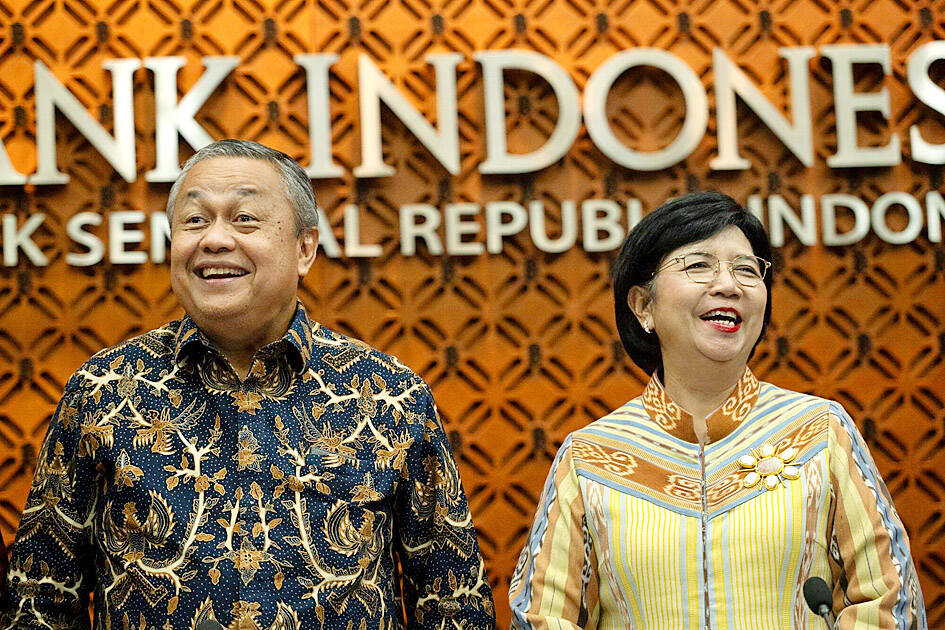Indonesia’s central bank yesterday unexpectedly cut key interest rates for the first time in more than three years as the rupiah strengthens and ahead of an expected US Federal Reserve rate reduction later in the day.
Bank Indonesia lowered the seven-day reverse repurchase rate by 25 basis points to 6 percent, marking the first such move since early 2021. Its two other main rates were also cut by 25 basis points.
“The Federal Funds Rate direction is getting clearer, and the rupiah is relatively stable and even getting stronger,” Bank Indonesia Governor Perry Warjiyo said.

Photo: Bloomberg
“These two factors are the reason why we lowered the interest rate right now,” he said.
The Indonesian central bank had steadily increased borrowing costs to defend the rupiah amid growing global economic uncertainty and rising inflation.
However, with price rises slowing, Warjiyo said the decision to cut was consistent with the bank’s prediction that inflation would remain low this year and next.
After rallying almost 7 percent this quarter, Indonesia’s currency is trading close to its strongest level versus the US dollar in a year, thanks in large part to a likely Fed cut, and low and stable domestic inflation. That gave Warjiyo scope to act sooner rather than later — especially as a more aggressive cut from the Fed would risk further rupiah gains versus the US dollar.
Tight financial conditions after 275 basis points of Bank Indonesia’s rate hikes in the past two years are also starting to show in Southeast Asia’s largest economy, Bloomberg Economics’ Tamara Henderson and Andrej Sokol said in a note this week, supporting calls for an early rate cut.
While Indonesia’s economic outlook remains solid this quarter, with the central bank keeping its GDP growth estimate this year at a range of 4.7 percent to 5.5 percent, Warjiyo said that domestic activity needs to be supported.
Additional reporting by Bloomberg

NEW IDENTITY: Known for its software, India has expanded into hardware, with its semiconductor industry growing from US$38bn in 2023 to US$45bn to US$50bn India on Saturday inaugurated its first semiconductor assembly and test facility, a milestone in the government’s push to reduce dependence on foreign chipmakers and stake a claim in a sector dominated by China. Indian Prime Minister Narendra Modi opened US firm Micron Technology Inc’s semiconductor assembly, test and packaging unit in his home state of Gujarat, hailing the “dawn of a new era” for India’s technology ambitions. “When young Indians look back in the future, they will see this decade as the turning point in our tech future,” Modi told the event, which was broadcast on his YouTube channel. The plant would convert

‘SEISMIC SHIFT’: The researcher forecast there would be about 1.1 billion mobile shipments this year, down from 1.26 billion the prior year and erasing years of gains The global smartphone market is expected to contract 12.9 percent this year due to the unprecedented memorychip shortage, marking “a crisis like no other,” researcher International Data Corp (IDC) said. The new forecast, a dramatic revision down from earlier estimates, gives the latest accounting of the ongoing memory crunch that is affecting every corner of the electronics industry. The demand for advanced memory to power artificial intelligence (AI) tasks has drained global supply until well into next year and jeopardizes the business model of many smartphone makers. IDC forecast about 1.1 billion mobile shipments this year, down from 1.26 billion the prior

People stand in a Pokemon store in Tokyo on Thursday. One of the world highest-grossing franchises is celebrated its 30th anniversary yesterday.

Zimbabwe’s ban on raw lithium exports is forcing Chinese miners to rethink their strategy, speeding up plans to process the metal locally instead of shipping it to China’s vast rechargeable battery industry. The country is Africa’s largest lithium producer and has one of the world’s largest reserves, according to the US Geological Survey (USGS). Zimbabwe already banned the export of lithium ore in 2022 and last year announced it would halt exports of lithium concentrates from January next year. However, on Wednesday it imposed the ban with immediate effect, leaving unclear what the lithium mining sector would do in the